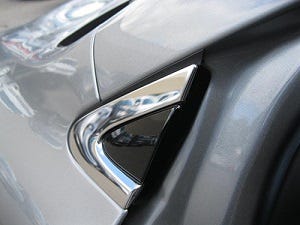A challenging task of bonding together two different rigid substrate materials—acrylonitrile styrene acrylate (ASA) and polycarbonate/acrylonitrile styrene butadiene (PC/ABS)—in an automotive A-pillar window application has been achieved through utilization of a thermoplastic elastomer (TPE) from Kraiburg TPE. The materials supplier teamed up with its distributor Chase Plastics and processor Innotech Precision Inc. to deliver the solution to a leading U.S.-based automaker.
June 25, 2015
A challenging task of bonding together two different rigid substrate materials—acrylonitrile styrene acrylate (ASA) and polycarbonate/acrylonitrile styrene butadiene (PC/ABS)—in an automotive A-pillar window application has been achieved through utilization of a thermoplastic elastomer (TPE) from Kraiburg TPE. The materials supplier teamed up with its distributor Chase Plastics and processor Innotech Precision Inc. to deliver the solution to a leading U.S.-based automaker.
|
A-pillar application employs TPE to bond disparate rigid resins. |
Chase Plastics was working with Innotech Precision on the A-pillar window application, with Innotech searching for a TPE for its second shot soft-touch plastic that would adhere to the aforementioned substrates. The molder had previously trialed three different kinds of TPE brands and none were able to fulfill the application requirements.
The compounds first trialed tended to stick to the mold cavity during processing. Further, they would not bond to the harder substrates. In February 2014 with start of production quickly approaching the following month, both Innotech and Chase weere desparate for a rather rapid and effective solution.
The solution they turned to was a Kraiburg TPE material from the supplier's Thermolast K series that is reportedly optimal for adhesion and exterior automotive applications. This particular grade exhibited superior chemical bonding and better processing characteristics than any other material trialed thus far. Over 250,000 vehicles have been delivered to date that use the TPE solution. Production is expected to run for five years.
Thermolast K series materials are based on hydrogenated block copolymers. In addition to their ASA and PC/ABS bonding capabilities, they also feature outstanding sealing and non-slip properties as well as bonding to other engineered plastics such as PC, acrylic (PMMA), polyacetal (POM) and polyamide (PA).
You May Also Like



